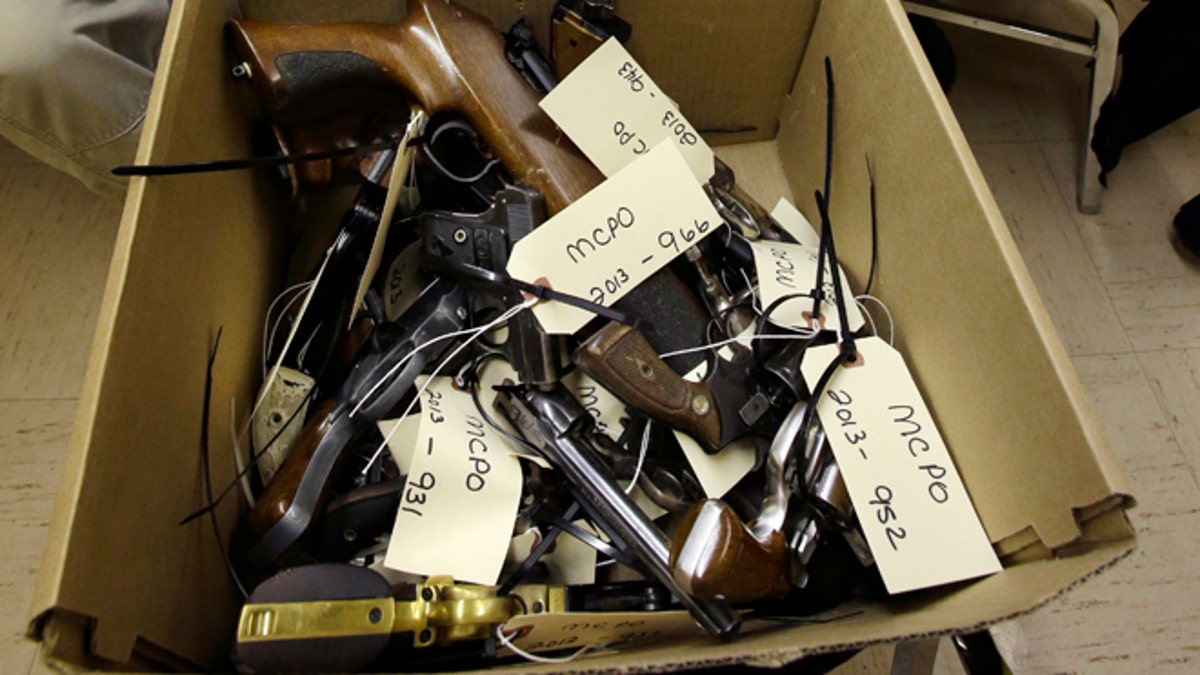
Jan. 26, 2013: Hand guns are seen in a box in Trenton, N.J., during a gun buyback event. (AP)
For lawmakers in Georgia's struggling urban sphere, the mandate in the aftermath of the recent elementary school massacre in Newtown, Conn. is simple: spray and pray, littering the legislative docket with gun control measures so great in number that one of the battery would necessarily curb violence.
And in the universal storehouse of political theater, few choreographed stunts outstrip those celebratory press conferences in which grinning politicians unveil teetering mountains of weapons reclaimed through buyback programs. Flexed poses are struck, cameras flash and yet gun violence remains a constant.
So it is in College Park, a southwest metropolitan Atlanta community, where city councillors unanimously approved this week a first-in-the-state government buyback program wherein the city will award residents with $100 for the surrender of operable handguns, shotguns or rifles. An additional $50 premium will be paid to those ditching assault weapons.
The measure's champion in city hall proffered the program as an "amnesty day for guns" during which no questions by law enforcement would be asked of participants. "Every gun that we pay for and get off the street," Councilman Joe Carn said, "will be one less gun, one less assault."
But when the city has drained its $20,000 buyback reservoir, it will not have been through the participation of violent criminal offenders, baited by the shallow promise of no-questions-asked. Instead, it will be the senior citizen concerned with the growing cost of prescription medication or the single mother who finds more value in the food security of her young child than an inherited hunting rifle gathering dust in the attic.
Cash-for-guns is an alluring proposition for many in this slipshod suburb, where the poverty rate is fully double the state average of 15.7 percent.
Nearly one out of every three residents are financially impoverished. Of those households subsisting below the poverty line, some 81 percent are single-parent homes in which the father is absent and another 5 percent where only the father is present.
It earned the ignominy of the law enforcement community in 2008 when it became the most crime-riddled municipality per capita in Georgia and remains one of the state's most unsafe places to live, for which its population plummeted 30 percent between 2009 and 2010.
College Parks is a deeply ailing community, ravaged by a sustained business exodus and white exurban flight. Crime is high and jobs are few, but a gun buyback will do little to overhaul the structural root of the city's decline and crime.
Federal studies show these programs earn only the participation of law-abiding working class poor, for whom $100 would go a long way in diapers and groceries. Meanwhile, still-armed criminals rule the slumburb.
In a 2004 report, the National Research Council, the analytical arm of the National Academy of Sciences, criticized the theoretical underpinning of buybacks--a necessary consequence of fewer guns is fewer gun-related crimes--"badly flawed" and among the least effective vehicles to stem gun violence.
Empirical evidenced gleaned from buyback programs across the country indicated reclaimed weapons fell into two categories: malfunctioning firearms and inherited weapons from disinterested owners. By contrast, researchers said those gun owners who acquired weapons, either legally or by theft, with the intent of engaging in criminal activity were wholly unlikely to participate.
Lawmakers are right to address the issue of gun violence--indeed, a recent public opinion survey found a solid majority of Georgians favor some new gun control measures, including universal background checks--but gun buybacks are profoundly dangerous, inefficacious policy. Our underserved urban communities deserve more than political performance art.
